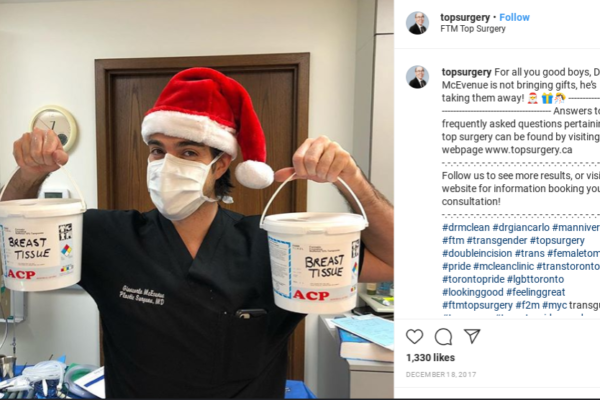This article was contributed by @Mumtears1 (Twitter handle). She is a registered nurse, a wife, and a mum of two daughters, currently aged 25 and 22 years old. She lives in western Canada with her husband of 29 years. We’re very grateful for her personal and professional perspective on this issue. She has also written for the blog and excellent resource site 4th Wave Now.
by @Mumtears1
Over 6 years ago, my youngest daughter (then 16) expressed to her dad and me that she “thought she should be a boy”. That was the day our family life changed in ways we never anticipated.
Throughout childhood, our daughter never presented as stereotypically “masculine”. She never outwardly expressed to us any kind of discomfort. She appeared to be mostly happy. A bright spark. She loved to play outside: doodle with chalk on sidewalks, sandbox play, climb trees, ride bikes. She smiled often. She loved building with Lego, playing Polly Pockets and with tiny toy horses. She enjoyed making tiny crafts, including models of people and animals made of Sculpey clay.
She was very academically smart, reading beginner short novels before entering Grade 1. When she was about 8 years old and with the help of her father she built one amazing bicycle from two used bikes purchased at a garage sale. In Grade 4 she challenged a Math unit on fractions and passed the final exam with flying colours, even before the unit began. She was musically advanced, playing beautiful piano tunes at age six, wonderful tenor saxophone solos in junior high. We had her tested for giftedness and was told she was “just below” the gifted category.
We noticed some general social discomfort in late junior high, but we assumed that this was normal teen awkwardness so we were not concerned about it. We were absolutely blindsided by her proclamation that she thought she would be a boy.
Medical best practice is to start with the least invasive options
I’ve been a registered nurse for over 30 years. From childhood, I always wanted to be a nurse – I feel like being in the nursing profession is a “calling” for me.
While studying for my Bachelor of Nursing degree, we were taught that in all situations, medical and nursing treatments should always begin with the least invasive way to treat the condition. I was taught that this was best practice care for the human body.
I’ve had many years’ experience working in Acute Care Pediatrics at our local children’s hospital. It was there that I learned that children are not simply “little adults”. Pediatric patients require specific attention and care, due to their rapidly developing minds and bodies. Their bodies and minds function very differently from adults. Medications and treatments are prescribed based on the child’s body weight. They also cross different developmental stages at different rates on their way to becoming adults.
Before our daughter told us she thought she should be a boy, I had already seen and assessed countless adult transgender patients. I worked with a family physician who also specializes in transgender care and sexual health.
I admit that when I first started working in that family practice, I was very naïve about what “transgender” means. I noticed that all of the adult transgender patients I met also had comorbid mental health issues, which had not been fully resolved and, in some cases were severe/debilitating. My professional duty was to provide excellent, compassionate nursing care to these patients. My personality is compassionate, empathetic and caring. I learned some of the transgender lingo; for example, “top” and “bottom” surgery. I administered countless testosterone injections. I changed the dressing on the donor arm of a young 20-something female-to-transgender patient who had recently undergone phalloplasty surgery. From that time on, after I administered these injections, I found myself in the staff washroom, trying to compose myself for my next patient. Watching female erasure (in particular) causes me much sadness, partly due to what is going on with my own daughter. But mostly due to the fact that I am an adult female-born woman.
Puberty blockers and cross-sex hormones are easy to acquire
I was taught that physical, mental, and emotional development in children is ongoing, well into the early to mid-20s. Because of my knowledge about child development, both body and mind, I don’t understand why the medication Lupron is being given to healthy-bodied children. This medication is approved for use to treat adults with advanced prostate cancer and endometriosis. In children, it’s used to slow down precocious (early-onset) puberty. It’s only been recently that it’s being prescribed for children who have gender dysphoria. This is an off-label use for this drug and it’s being given to healthy-bodied children, even though there has been no research done to determine its safety or efficacy regarding gender dysphoria.
And we know that puberty blockers lead, in most cases, to cross-sex hormones. Why is the current first-line treatment for gender dysphoria in young, healthy bodies off-label, unstudied cross-hormone prescriptions?
Adolescent girls can go into a family doctor’s office, state “I’m transgender”, and be handed an Rx for Androgel. This is what happened with my daughter when she was 19. She was in a lengthy queue to be seen by our city’s gender specialist/psychiatrist and was impatient. She gave us no concrete reasons for wanting to start taking testosterone. She demonstrates little outward discomfort when she is in our home or when interacting with extended family.
She had one visit with the same family doctor who gave her the Androgel Rx. She told us that he told her what side effects could occur (while reading from a computer screen). She told us that he did not discuss reproductive planning with her and that he gave her no written information about any of the side effects. She told us that he gave her the prescription and some bloodwork requisitions. This family doctor did not take a multidisciplinary team approach; he acted on his own. He did not refer her to an endocrinologist to check her hormone levels. He did not send her to any mental health professional, who could have assessed her for the source of her discomfort and possibly provided her with other less-invasive treatment options, such as cognitive behavioural therapy.
How is the way in which this family doctor gave my daughter this off-label cross-hormone prescription medically ethical? In my province, family physicians can be the primary prescriber of cross-sex hormones. While using a multidisciplinary approach might be a good practice, it is not mandated. I’m currently trying to find answers via our provincial and national medical associations. The answers I’m looking for aren’t forthcoming.
When my daughter turned 21 she had double mastectomy surgery.
She went to the McLean cosmetic surgery clinic in Toronto which uses an informed consent approach for FTM chest masculinization. The informed consent approach consisted of filling out an on-line form. She self-scheduled and found a way to privately pay for this procedure.”
“The McLean Clinic’s philosophy is that the achievement of personal goals should not be hampered by artificial barriers.”
She was a young adult by this time but had clearly started down this path when she was an impressionable teenager. She’s never had a mental health assessment, yet she was affirmed by professionals in her chosen gender and she was prescribed testosterone which isn’t even recommended for use in male patients unless absolutely necessary.
The pharmacy companies’ printed drug information about testosterone products states that this medication should not be given to women. It has never been studied in female bodies. There are no long-term studies which indicate safety or a positive result for females who take this medication. Physicians are prescribing it “off label”.
Rapid Onset Gender Dysphoria is a new and unstudied phenomenon
When I learned about the newly recognized “rapid onset gender dysphoria”, I realized that much of its description matched what we were/are witnessing in our youngest daughter. Currently there is little known regarding care or treatments for young people presenting with rapid onset gender dysphoria. And few physicians are even aware of this phenomenon. There has been a dramatic increase, over a short period of time, in the number of teens and young adults who are seeking care for being transgender. And the demographic for which sex is declaring transgender has also changed. There are now more natal females than males with this concern.
Thinking back to a time in her early childhood, I wonder if my youngest daughter’s gender discomfort might be attributed to her personality. My oldest daughter never had a temper tantrum when she was a toddler. I thought it was down to good parenting. How wrong I was. When our younger daughter was born, she behaved quite differently from her sister. She started having temper tantrums at 18 months of age, which lasted 4 long years. Then, it was like a light switch turned on. Suddenly she realized she could settle her emotions down by reading quietly, alone on her bed. After 4 years of a frequently chaotic time, our house and family seemed to be at peace again.
Could her gender dysphoria be a similar phase? Some kind of reaction to the world around her that she is trying to control in her own way. Now that she’s a young woman I pray that, with time and life experience, she will develop an acceptance and comfort with her female body, and the knowledge that being the female sex does not have to place limits on her happiness and what she can accomplish in life.
With all that I have learned about rapid-onset gender dysphoria and current treatments for it, I have more questions: Why are these off-label testosterone prescriptions being given to young healthy-bodied female patients as a first-line treatment for gender dysphoria? Especially since it is known that testosterone causes permanent body changes in female bodies, making it an invasive and irreversible treatment. Why are physicians prescribing these off-label cross-hormones without doing further assessments to ensure that this is the best treatment for their patients? I believe these are reasonable questions to ask. I believe these are prudent questions to consider. It is not transphobic to ask these questions. Many parents are asking questions like these. If you’re a parent wanting to learn more and connect with other parents, you can check out: https://gendercriticalresources.com/Support/index.php
Hope for her future
She is currently living away for university, in a city which is a 2-hour drive from our home, studying in an arts program there. She continues to take injectable testosterone and has legally changed her name and “gender” marker. We text with her weekly and she has visited us occasionally for family events. We have a close extended family and some of them still call her by her birth name. Our older daughter knows and supports her sister’s claims. Both of my daughters are passionate about social justice issues.
My daughter and I text back and forth. We text about her activities (theatre, parkour). About her work. About her classes (she studies hard and gets excellent grades). About her saxophone practice (she recently was very excited to be accepted into the university’s jazz ensemble). I am proud of the person she is. I see so much potential for her to become an amazing woman and I am sad that she is putting her health at risk by trying to erase her female body.
She tells us that she loves us. We have clearly told her that we love her and always will. We financially help support her post-secondary education. We want her to have many good job opportunities. We want her to have a good life and be happy and healthy. I dread her voice changing. I dread seeing her beautiful face change. And I find myself wondering if she actually needs to go through all of this, in order for her to “find herself” and come out the other side.
The birth name we gave her means “strong”. I thought this would serve her well. We continue to use her birth name because we have not given up hope. As parents, we were never prepared for any of this. And as a Registered Nurse, I am very disturbed by all of it.




I feel for you. I think the current medical establishment response to young people self diagnosing gender dysphoria is confused, misguided and harmful. I’m beginning to reach out to other doctors to try to raise an alarm.
I think most doctors view gender as something too complicated to understand, and apparently something like a civil rights movement, so they defer to the “experts.” Unfortunately right now the experts are ideologues and activists supported by pharmaceutical companies interested in vast new markets.